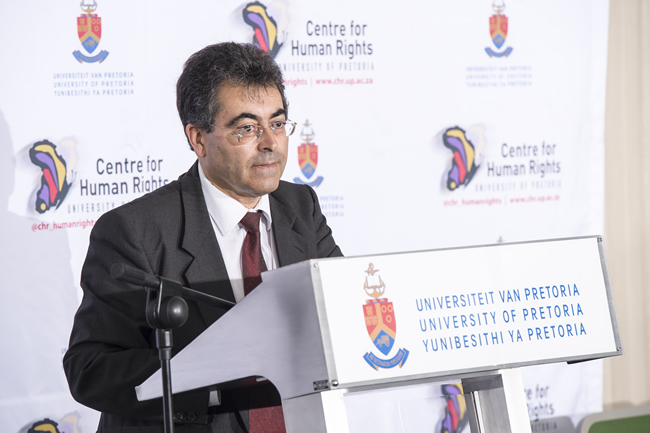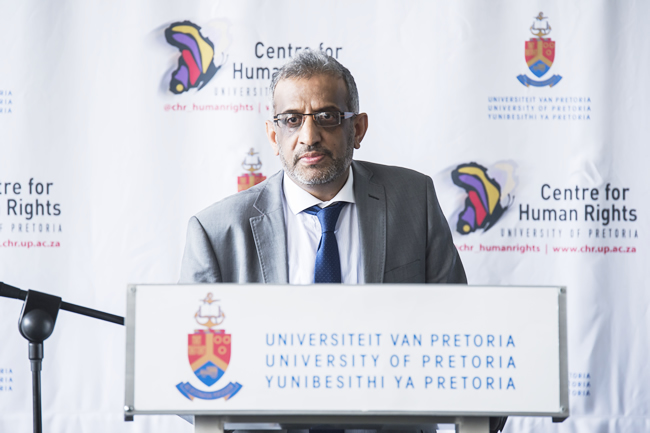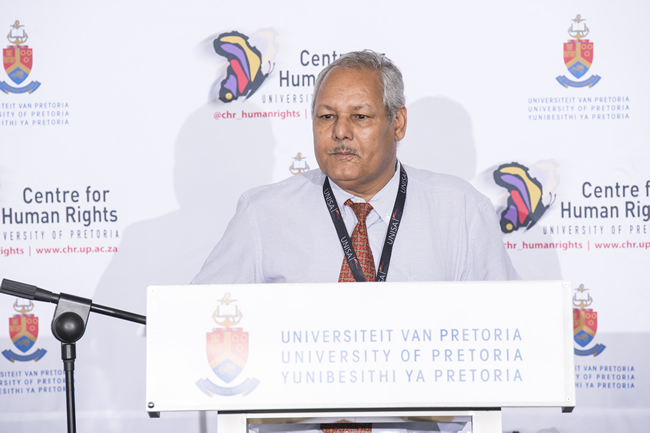With Morocco’s re-entry into the African Union (AU) earlier in 2017, important questions around the self-determination of the people of the Sahrawi Arab Democratic Republic (SADR) have taken centre stage again. To answer some of these questions, the Centre for Human Rights, University of Pretoria, together with the Embassy of the SADR in South Africa, hosted a panel discussion on Monday 27 February 2017.
The event brought together ambassadors, members of the diplomatic corps, students, academics and representatives of state authorities, under the theme ‘Self-determination delayed: The Sahrawi Arab Democratic Republic’. The panel consisted of Ambassador Radhi Bachir (Ambassador to South Africa from the SADR), Ambassador Ghulam Asmal (Director: NEPAD and Partnerships in the South African Department of International Relations and Cooperation (DIRCO)) and Mr José Nascimento (Practitioner and international law expert).
![]() Download this press statement
Download this press statement![]() Download Ambassador Radhi Bachir's address
Download Ambassador Radhi Bachir's address
The SADR (more commonly known as Western Sahara) is the last territory on the African continent whose post-colonial future is still undecided. After the withdrawal of Spanish colonisers in 1975, and with Morocco neutralising Mauritania’s claims to the territory by military might, the Western Sahara has been the locus of armed conflict between Morocco and the Polisario Front - an organisation representing the indigenous Sahrawi people. Large parts of the territory of the Western Sahara are today still under Moroccan military control. In 1984 Morocco withdrew from the Organisation of African Unity (OAU), the AU's predecessor, after the OAU admitted the SADR into the institution.
In defiance of several United Nations Security Council resolutions, a ground-breaking International Court of Justice decision, and several mediation efforts by the AU, Morocco remains a stumbling block to self-determination in Western Sahara.
Commenting on this obstacle, Ambassador Bachir delivered a moving description of the struggle endured by the Sahrawi people. ‘For more than five decades’, he said ‘the question of Western Sahara, its people and their struggle for independence has remained unanswered’. The solution to this question, Bachir proposed, was for the Moroccan government to allow a referendum among the inhabitants of the Western Sahara on the question of self-determination. He called this a ’face-saving formula, one that will lead to a confirmation of Sahrawi independence’.
Bachir’s suggestion is not a new proposal. As far back as 1991, Moroccan forces and the Polisario Front agreed on a UN-brokered ceasefire and referendum to settle the status of the SADR. To date, no such vote has ever taken place. ‘The territory of Western Sahara stands out today as Africa’s last colony’, said Bashir, commenting on the possible intentions behind Morocco’s return to the AU. He observed with cynicism that ‘conflicting signals are emerging from Moroccan officials as to the existence of a real political will to be awakened from their long colonial dreams’.
His sentiments were shared by Mr Nascimento, who suggested that Morocco’s re-admission was driven by economic, as opposed to political forces. He cited the 2015 Court of Justice of the European Union decision that prevented the sale of Western Saharan goods within the European Union (EU). Nascimento remarked that Morocco’s claim to the SARD could have less to do with ‘historical ties’, and more with the presence of valuable phosphate reserves within the territory, and the profits to be harnessed from its waters which are rich in marine life. He suggested that Morocco had identified Africa as a new market for its products, to compensate for its rejection by EU.
 Mr José Nascimento (Practitioner and international law expert
Mr José Nascimento (Practitioner and international law expert
Departing slightly from the views of the other panelists, Ambassador Asmal’s address assumed a more pragmatic tone. ‘Diplomatic relations are not a checkers board’, he told the audience, ‘with every country divided into neat, little blocks’. He said South Africa always welcomed Morocco’s readmission, as it could lead to a more constructive solution to the conflict. ‘It’s better to have people at the table talking then outside making noise’. In Ambassador Asmal’s view, regardless of what its intentions might be, Morocco is now accountable to the AU and its member states. Its admission may not signify an end to the Western Saharan conflict in the immediate sense, but it could serve as the basis for a lasting solution. There is hope, that under collective pressure, and perhaps out of its own self-interest, Morocco will soon engage in genuine negotiations within the SADR and grant the Sahrawi the chance to determine their own destiny.
At the same time, given the relatively recent struggle of South Africans for their own self-determination, South Africa remains committed to see the full accomplishment of the self-determination of the Sahrawi people.
 Ambassador Ghulam Asmal (Director: NEPAD and Partnerships in the South African Department of International Relations and Cooperation (DIRCO))
Ambassador Ghulam Asmal (Director: NEPAD and Partnerships in the South African Department of International Relations and Cooperation (DIRCO))
